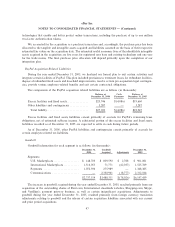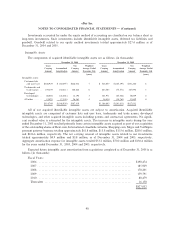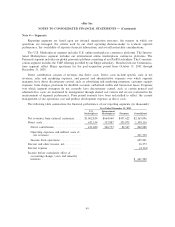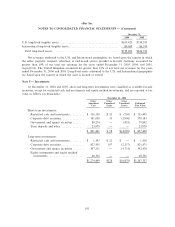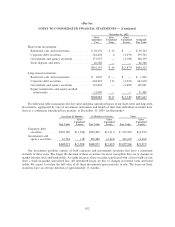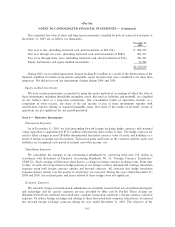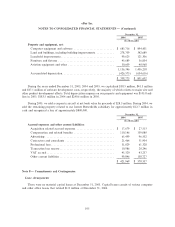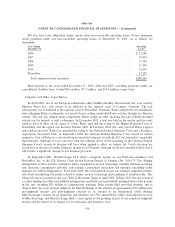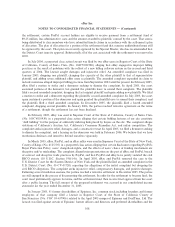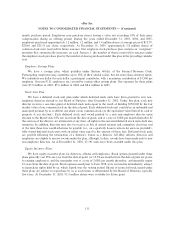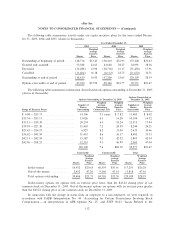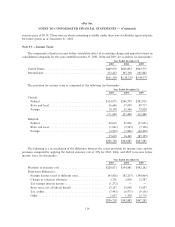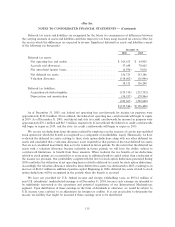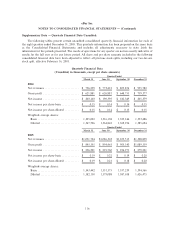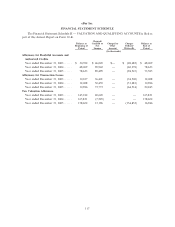eBay 2005 Annual Report Download - page 111
Download and view the complete annual report
Please find page 111 of the 2005 eBay annual report below. You can navigate through the pages in the report by either clicking on the pages listed below, or by using the keyword search tool below to find specific information within the annual report.eBay Inc.
NOTES TO CONSOLIDATED FINANCIAL STATEMENTS Ì (Continued)
In March 2005, the U.S. Court of Appeals for the Federal Circuit issued a ruling in the appeal of the
MercExchange patent litigation suit which, among other things (1) invalidated all claims asserted against
eBay and Half.com arising out of the multiple database search patent and reduced the verdict amount by
$4.5 million; (2) upheld the electronic consignment system patent; (3) affirmed the district court's refusal to
award attorneys' fees or enhanced damages against us; (4) reversed the district court's order granting
summary judgment in our favor regarding the auction patent; and (5) reversed the district court's refusal to
grant an injunction and remanded that issue to the district court for further proceedings. In May 2005, the
Court of Appeals for the Federal Circuit granted our petition to stay the mandate in the case in order to allow
us to petition the U.S. Supreme Court for review on certain issues. We filed our petition for review with the
U.S. Supreme Court in July 2005, and on November 28, 2005, the Court granted our petition for review. Oral
arguments in the case are scheduled for March 29, 2006. In parallel with the federal court proceedings, at our
request, the U.S. Patent and Trademark Office is actively reexamining each of the patents in suit, having
found that substantial questions exist regarding the validity of the claims contained in them. In January 2005,
the Patent and Trademark Office issued an initial ruling rejecting all of the claims contained in the patent that
related to online auctions; in March 2005, the Patent and Trademark Office issued an initial ruling rejecting
all of the claims contained in the patent that related to electronic consignment systems; and in May 2005, the
Patent and Trademark Office issued an initial ruling rejecting all of the claims contained in the patent that
related to multiple database searching. Even if successful, our litigation of these matters will continue to be
costly. In addition, as a precautionary measure, we have modified certain functionality of our websites and
business practices in a manner which we believe would avoid any further infringement. For this reason, we
believe that any injunction that might be issued by the district court will not have any impact on our business.
We also believe we have appropriate reserves for this litigation. Nonetheless, if we are not successful in
appealing or modifying the court's ruling, and if the modifications to the functionality of our websites and
business practices are not sufficient to make them non-infringing, we would likely be forced to pay significant
additional damages and licensing fees and/or modify our business practices in an adverse manner.
In August 2002, Charles E. Hill & Associates, Inc. filed a lawsuit in the U.S. District Court for the
Eastern District of Texas (No. 2:02-CV-186) alleging that we and 17 other companies, primarily large
retailers, infringed three patents owned by Hill generally relating to electronic catalog systems and methods for
transmitting and updating data at a remote computer. The suit seeks an injunction against continuing
infringement, unspecified damages, including treble damages for willful infringement, and interest, costs,
expenses, and fees. The case was transferred to the U.S. District Court for the Southern District of Indiana in
January 2003, but was transferred back to the U.S. District Court for the Eastern District of Texas in
December 2003. A claim construction hearing was held in August 2005. In February 2006, we entered into a
settlement agreement with the plaintiffs in the case under which we will be licensed under all of the patents at
issue.
In February 2002, PayPal was sued in California state court (No. CV-805433) in a purported class action
alleging that its limiting access to customer accounts and failure to promptly restore access to legitimate
accounts violates California state consumer protection laws and is an unfair business practice and a breach of
PayPal's User Agreement. This action was re-filed with a different named plaintiff in June 2002 (No. CV-
808441), and a similar action was also filed in the U.S. District Court for the Northern District of California
in June 2002 (No. C-02-2777). In March 2002, PayPal was sued in the U.S. District Court for the Northern
District of California (No. C-02-1227) in a purported class action alleging that its limiting access to customer
accounts and failure to promptly restore access to legitimate accounts violates federal and state consumer
protection and unfair business practice laws. The two federal court actions were consolidated into a single case,
and the state court action was stayed pending developments in the federal case. In June 2004, the parties
announced that they had reached a proposed settlement. The settlement received approval from the federal
court on November 2, 2004, and the state court action was dismissed with prejudice in March 2005. In the
settlement, PayPal does not acknowledge that any of the allegations in the case are true. Under the terms of
107


